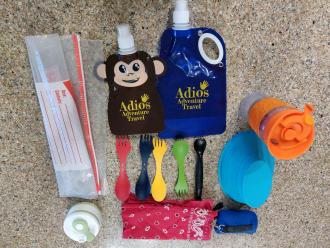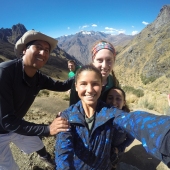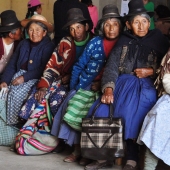
How to Travel Plastic Free: Make your Own Kit
Single-use plastic water bottles are just the tip of the proverbial ice-berg of waste generated by humans all over the globe on a daily basis. Every time we consume foods and beverages inside and outside our homes we are making choices that go way beyond what's on the menu! We're voting with our dollars for food service infrastructure that supports and reinforces systems for growing, processing, handling and marketing consumables. I believe that the issues we now acknowledge with plastic bottles and plastic shopping bags are getting us closer to seeing the hidden scourge of our century: How we handle the refuse of living in modern times.
We rely on our local governments to handle all aspects of our refuse. But what if we take a different approach? What if each of us changed our behavior and reduced our use of disposables? What if each of us makes it our personal goal to reduce the average 4.4 pounds per person per day waste we're responsible for? This is a problem that each of us has the power to change.
Grass-Roots Movements.
If you're waiting for corporations and governments to legislate changes, don't hold your breath. I believe a grass-roots campaign can start a revolution that reduces a significant portion of the waste that each of us is responsible for generating. Two examples of famous grass-roots organizations that are now embedded in our culture are Alcoholics Anonymous and La Leche League. They each started with a small group of friends sitting around a kitchen table (or a bar!) coming up with real solutions to their real problems. Why can't we do this for our trash problems?
Before we can solve the problem, we have to own it. Take a look at your lifestyle for ways to reduce the way you use not just plastic but packaging and single-use containers. What if we stopped (or at least reduced) buying products only served in disposable containers? We have the knowledge and ability to incorporate "Leave No Trace" principles into our everyday urban lives. The path to do this might be different for everyone. But the net result will be the same for the planet. Less waste. It doesn't have to happen overnight, but by the time the next generation is in charge, the "no plastic revolution" will be one for the history books.
Where do you begin to reduce waste in your life?
Start small. Just start. Rid your life of disposable water bottles and plastic shopping bags. Then graduate to other areas. Each person can establish their own individual supply chain for consuming edibles as well as non-edibles. Before long it will become natural and you won't notice how easy it is. Here's 9 ways to reduce the use of plastic in your life.
Travelers are especially vulnerable to the convenience of using disposables when on the move. So I came up with my own DIY kit with tools for consuming food and beverages on the go. I found these items laying around my house.
Build your own DIY kit for waste-free drinking and eating on the run: 
- Reusable water bottle or pouch (I prefer pouches because they fold and take up very little space)
- Reusable cups for coffee, drinks or wine. Collapsible cups now come with lids and features that make them convenient to use on the go
- Bandana - remember the red bandanas from the 60s? We used them for everything back then. We called them APRs (all-purpose rags)
- Spork - Start by reusing those plastic forks and spoons you have laying around! Wash them and use over and over.
- Zip loc bags - Buy sturdy reusable silicone bags or reuse the plastic bags you have.
- Hand sanitizer - ditch the pre-wrapped wipes and go with large container which can be poured (pushed) into a smaller container you saved from tossing into the trash heap
- Packable backpack or reusable shopping bag for carrying take-out food. It's OK to reuse the plastic bags we all have.
- Tin or wooden bowls or plates come in a variety of sizes. If you have reusable plastic containers with lids, take them. Buy a collapsible bowl.
- Water purification. For travelers in foreign countries, there are various devices that can be used for making safe drinking water from your hotel tap.
- Straws? Really? Unless you've had a recent dental procedure or medical condition that prevents drinking from a cup, maybe we can suffer through slurping from the edge of a container, not through a tube? But if you must, carry your own resusable straw.
Check out these pre-made kits for sale.
While it's preferable to recycle items from your home or local thrift store, there is now a company that offers pre-made kits with everything you need to achieve "zero-waste" in your life. Check out Zoetica
Think of the trash that's generated by travelers passing through airports? What if we asked restaurants and cafes to serve food into our own containers? What if we stopped buying pre-packaged foods? If travelers start making different choices at the point of sale, the suppliers will adapt!
Patagonia banned plastic single-use containers and wraps of all kinds since 2014. And Machu Picchu banned plastic bottles beginning in 2019. Europe and states in the US are working on legislation to restrict and ban single-use plastic, but we can change our behaviors now. It's just a matter of time before the most convenient packaging invented in the history of humankind is no longer relegated to the trash heap for future generations to deal with.













